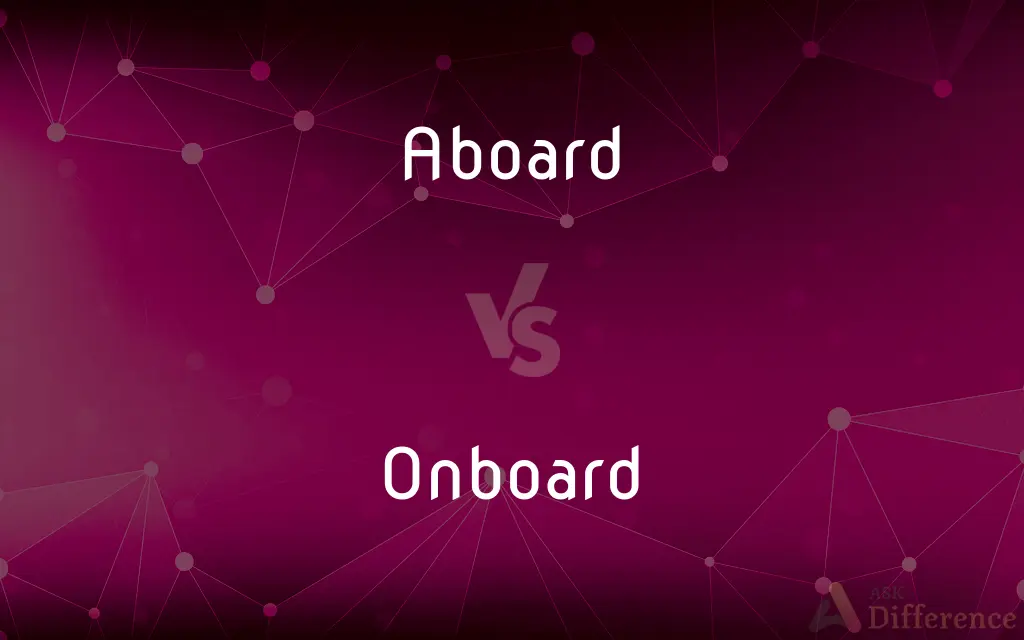Aboard vs. Onboard — What's the Difference?
Edited by Tayyaba Rehman — By Fiza Rafique — Updated on September 21, 2023
"Aboard" refers to being on or in a vehicle, typically a ship, train, or plane. "Onboard" has a similar meaning but is often used more broadly, extending to concepts like welcoming someone into a project or organization.

Difference Between Aboard and Onboard
Table of Contents
ADVERTISEMENT
Key Differences
"Aboard" is primarily used to indicate that someone or something is physically on a vehicle, such as a ship, train, or airplane. "Onboard" serves a similar function but has a broader scope. It can refer to being on a vehicle, but it can also refer to being part of a group, project, or process.
Both "aboard" and "onboard" are prepositions that signify inclusion or participation. However, "aboard" is more traditionally used in nautical and aeronautical contexts. For example, "All passengers aboard the ship must check in," versus "We have a new team member onboard."
In the corporate world, "onboard" is often used to signify the process of integrating a new employee into the organization. For example, "The HR department is responsible for onboarding new hires." This sense of the word doesn't work interchangeably with "aboard," which is not used to describe integration into groups or organizations.
Despite their nuanced differences, "aboard" and "onboard" can sometimes be used interchangeably when referring to transportation. For instance, "Please come aboard" and "Please come onboard" both invite someone onto a vehicle. However, the key differentiation is that "onboard" has expanded to include conceptual and figurative uses, while "aboard" remains rooted in its original, literal meaning.
Comparison Chart
Primary Usage
Physical location on a vehicle
Physical location or conceptual involvement
ADVERTISEMENT
Contexts
Nautical, aeronautical, vehicular
Nautical, aeronautical, vehicular, corporate
Part of Speech
Preposition
Preposition or adjective
Connotation
Literally on a vehicle
On a vehicle or part of a group/project
Corporate Usage
Rarely used
Commonly used for integration processes
Compare with Definitions
Aboard
Physically situated within a vehicle.
We were already aboard when the announcement was made.
Onboard
Involved or participating in a project or group.
We need to get you onboard with the new marketing strategy.
Aboard
Onto a form of public or private transportation.
The last passengers hurried aboard the plane.
Onboard
Willing to participate or contribute.
Once he understood the project's benefits, he was onboard.
Aboard
On or into a ship, plane, or train.
They went aboard the cruise liner for a week-long journey.
Onboard
On or into a vehicle, such as a ship, plane, or car.
The flight attendant welcomed everyone onboard.
Aboard
On board a ship, train, aircraft, or other passenger vehicle.
Onboard
Integrated into a system or organization.
She was onboarded during the company's busiest season.
Aboard
At the side; alongside.
Onboard
Carried or used aboard a vehicle or vessel
Onboard radar systems.
Aboard
In or into a group, organization, or business
Brought aboard two new designers.
Onboard
Participating in or supporting an effort
I contacted my sisters to make sure they were onboard before I booked the beach house for our vacation.
Aboard
(Baseball) On base.
Onboard
Onto a vehicle or vessel
"His 'semi-fiancée' came onboard at Cape Town" (Dale Peterson).
Aboard
On board of; on; in.
Onboard
Into a state of participation of support for an effort
"If you were running one of the organization's programs or schools, you did everything you could to get the parents onboard" (Paul Tough).
Aboard
On board; into or within a ship or boat; hence, into or within a railway car.
We all climbed aboard.
Onboard
Aboard
"the long hours onboard an aircraft on the way to some diplomatic engagement abroad" (Molly Worthen).
Aboard
On or onto a horse, a camel, etc.
To sling a saddle aboard.
Onboard
To introduce to a system or process
A human resources administrator who onboards new hires.
Aboard
(baseball) On base.
He doubled with two men aboard, scoring them both.
Onboard
Carried or used on or in a vehicle or vessel
Aboard
Into a team, group, or company.
The office manager welcomed him aboard.
Onboard
Being a part of, being included in, participating in
When it comes to security, everybody seems to be as onboard as I am.
James is onboard as a production manager.
Aboard
(nautical) Alongside.
The ships came close aboard to pass messages.
The captain laid his ship aboard the enemy's ship.
Onboard
On or in a vehicle or vessel; aboard; on board.
Aboard
On board of; onto or into a ship, boat, train, plane.
We all went aboard the ship.
Onboard
To become a part of a group; to incorporate (someone) into a group.
Aboard
Onto a horse.
Onboard
To begin to use a product or service; to take (someone) on as a new customer of a product or service.
Aboard
(obsolete) Across; athwart; alongside.
Onboard
On a ship, train, plane or other vehicle
Aboard
On board; into or within a ship or boat; hence, into or within a railway car.
Onboard
Relating to the experience inside a vehicle.
The onboard entertainment kept the passengers amused.
Aboard
Alongside; as, close aboard.
Aboard
On board of; as, to go aboard a ship.
Aboard
Across; athwart.
Nor iron bands aboardThe Pontic Sea by their huge navy cast.
Aboard
On a ship, train, plane or other vehicle
Aboard
On first or second or third base;
Their second homer with Bob Allison aboard
Aboard
Side by side;
Anchored close aboard another ship
Aboard
Part of a group;
Bill's been aboard for three years now
Aboard
Being part of a transport journey.
Are you coming aboard for the next leg of the trip?
Aboard
Inclusion within a vehicular context.
With everyone aboard, we set sail.
Common Curiosities
What does "aboard" mean?
"Aboard" means being on or in a vehicle, typically a ship, train, or airplane.
Is "aboard" used in a corporate context?
"Aboard" is rarely used in a corporate context to describe inclusion in a group or project.
Can "aboard" and "onboard" be used interchangeably?
In the context of transportation, they often can be, but "onboard" has broader applications.
Is "onboard" used in nautical contexts?
Yes, "onboard" can be used in nautical contexts, much like "aboard."
What does "onboard" mean?
"Onboard" signifies being on a vehicle or part of a group, project, or process.
Is "onboard" used for new employees?
Yes, "onboard" is often used to describe the integration of new employees into an organization.
What is the primary context for "aboard"?
"Aboard" is primarily used in nautical, aeronautical, and vehicular contexts.
What types of vehicles can you be "onboard"?
Similar to "aboard," you can be "onboard" ships, airplanes, trains, and buses.
Can "aboard" be used for joining teams or projects?
"Aboard" is not commonly used to describe joining teams or projects.
What does it mean to be "onboard" with a project?
Being "onboard" with a project means you are involved or willing to participate in it.
Is "onboard" an adjective?
"Onboard" can function as both a preposition and an adjective.
Is "aboard" used as an adjective?
"Aboard" is typically used as a preposition and rarely as an adjective.
What's the main difference between "aboard" and "onboard"?
The main difference is the scope of usage: "aboard" is mainly for being on vehicles, while "onboard" can also refer to being part of a group, project, or process.
Does "aboard" signify willingness?
"Aboard" mainly indicates physical presence on a vehicle and doesn't imply willingness or unwillingness.
What types of vehicles can you be "aboard"?
Ships, airplanes, trains, and buses are typical vehicles you might be "aboard."
Share Your Discovery

Previous Comparison
Maniac vs. Psychopath
Next Comparison
Gastroscopy vs. EndoscopyAuthor Spotlight
Written by
Fiza RafiqueFiza Rafique is a skilled content writer at AskDifference.com, where she meticulously refines and enhances written pieces. Drawing from her vast editorial expertise, Fiza ensures clarity, accuracy, and precision in every article. Passionate about language, she continually seeks to elevate the quality of content for readers worldwide.
Edited by
Tayyaba RehmanTayyaba Rehman is a distinguished writer, currently serving as a primary contributor to askdifference.com. As a researcher in semantics and etymology, Tayyaba's passion for the complexity of languages and their distinctions has found a perfect home on the platform. Tayyaba delves into the intricacies of language, distinguishing between commonly confused words and phrases, thereby providing clarity for readers worldwide.














































